
Law and History Review
Scope & Guideline
Exploring the Intersections of Justice and Time
Introduction
Aims and Scopes
- Legal Pluralism and Historical Context:
The journal frequently addresses themes of legal pluralism, exploring how multiple legal systems coexist and interact within specific historical contexts, especially in colonial and post-colonial settings. - Interdisciplinary Approaches to Law:
It encourages interdisciplinary research that combines legal history with insights from sociology, anthropology, and cultural studies, enabling a richer understanding of how law shapes and is shaped by societal dynamics. - Impact of Law on Social Movements:
The journal often focuses on how legal frameworks influence social movements, rights, and justice, examining historical cases that illustrate the law's role in societal change. - Comparative Legal Histories:
There is a strong emphasis on comparative studies that analyze legal systems across different cultures and periods, providing insights into the global evolution of legal thought and practice. - Historical Case Studies:
The publication features detailed case studies that highlight significant legal transformations, landmark cases, and the evolution of legal institutions over time.
Trending and Emerging
- Human Rights and Legal History:
Recent papers increasingly connect historical legal practices to contemporary human rights issues, examining how past injustices inform current legal frameworks and advocacy. - Gender and Law:
There is a growing trend of exploring the intersection of gender and law, particularly how legal systems have historically shaped gender roles and rights, reflecting a broader societal interest in gender equality. - Environmental Law and Historical Contexts:
The journal is seeing an uptick in research linking environmental law to historical practices, addressing how past legal frameworks have influenced current environmental challenges and responses. - Legal Responses to Social Movements:
An emerging focus is on how legal systems have responded to social movements, examining historical case studies that reveal the dynamic interplay between law and activism. - Indigenous Legal Systems:
There is a notable increase in studies addressing indigenous legal systems and their historical contexts, highlighting the importance of recognizing and integrating indigenous perspectives within legal history.
Declining or Waning
- Traditional Legal Doctrines:
There has been a noticeable decrease in articles focusing on traditional legal doctrines and their historical interpretations, as contemporary scholarship increasingly prioritizes the social and political implications of legal systems. - Colonial Legal Frameworks:
Research centered solely on colonial legal frameworks without connecting them to current legal challenges or post-colonial analyses appears to be waning, as scholars seek more relevant and contemporary applications of historical legal studies. - Purely Theoretical Legal Discussions:
The journal has seen fewer contributions that engage purely in theoretical legal discussions without empirical grounding, indicating a trend towards research that is more practically applicable or historically contextualized. - Focus on Western Legal Histories:
There is a diminishing emphasis on Western-centric legal histories, as the journal increasingly embraces global perspectives and non-Western legal traditions, reflecting a broader shift towards inclusivity in legal scholarship.
Similar Journals
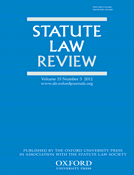
Statute Law Review
Navigating the Complexities of Statutory InterpretationStatute Law Review is an esteemed academic journal dedicated to the critical examination and analysis of statute law, publishing a broad range of scholarly articles that illuminate contemporary legal issues and enhance understanding within this specialized field. Published by Oxford University Press, the journal has been at the forefront of legal scholarship since its inception in 1980, and it continues to play a vital role in advancing legal discourse. With an impressive commitment to quality, Statute Law Review holds a Q3 quartile ranking in the law category and is recognized within the Scopus rankings as 694th out of 1025 in Social Sciences _ Law, indicating its relevance and contribution to the field. Although it is not an open-access journal, its rigorous peer-review process ensures that only the highest caliber of research is disseminated, making it an invaluable resource for researchers, practitioners, and students alike. As it converges into 2024, the journal remains a key platform for disseminating innovative ideas and fostering dialogue on the evolution and implications of statutory interpretation and application.

FORDHAM LAW REVIEW
Fostering Innovation in Legal Theory and PracticeFORDHAM LAW REVIEW is a prestigious legal journal published by Fordham University, School of Law, based in the United States. Established to disseminate cutting-edge legal scholarship, this journal has consistently achieved an impactful standing within the field, evidenced by its category ranking as Q1 in Law for 2023 and its Scopus ranking of #428 out of 1025 in the Social Sciences Law category, placing it in the 58th percentile. The journal welcomes submissions across diverse legal topics, fostering discourse that advances both legal theory and practice. Although it does not currently offer open access options, the Fordham Law Review serves as a vital resource for scholars, practitioners, and students seeking insights into contemporary legal challenges and developments. With its rich publication history dating back to the converged years of 1973 through 2024, the journal continues to be a cornerstone for rigorous legal analysis and a platform for influencing the evolution of law.

VIRGINIA LAW REVIEW
Cultivating a Legacy of Legal ExcellenceVIRGINIA LAW REVIEW is a preeminent legal journal published by the University of Virginia Law Review Association, recognized for its rigorous scholarship and intellectual discourse in the field of law. With an ISSN of 0042-6601, this journal has maintained a prominent position in academia, reflected in its Q1 category ranking in law and a Scopus ranking of #167 out of 1025, placing it in the top 17% of its field. Drawing upon a rich tradition dating back to its inception in 1967 and covering a broad spectrum from legal theory to practical applications, the Virginia Law Review aims to foster innovative legal thought and engage both scholars and practitioners. While it does not currently operate under an open access model, its contributions to scholarly research are invaluable, providing insights that significantly influence legal practices and policies. Situated in Charlottesville, Virginia, at 580 Massie Road, this esteemed publication appeals to researchers, legal professionals, and students alike, making it an essential resource for anyone eager to delve into the complexities of contemporary legal issues.

Materiali per una Storia della Cultura Giuridica
Unveiling Legal Histories, Enriching Cultural NarrativesMateriali per una Storia della Cultura Giuridica is a prominent academic journal that delves into the historical and cultural facets of legal systems and practices. Published by SOC ED IL MULINO in Italy, this journal stands as a critical resource for scholars in the field of law as well as sociology and political science. With an ISSN of 1120-9607, it is dedicated to fostering a deeper understanding of legal culture through robust research and scholarly discourse. Though categorized in Q4 for both Law and Sociology and Political Science as of 2023, the journal serves as an essential platform for emerging voices and innovative perspectives in its converge years from 2015 to 2024. While currently lacking open access options, it is invaluable for researchers striving to explore the intricate relationships between culture and law. With its insightful articles and comprehensive analyses, Materiali per una Storia della Cultura Giuridica plays a significant role in the academic landscape, making it a must-read for students, professionals, and researchers alike on their quest for knowledge in legal history and cultural studies.
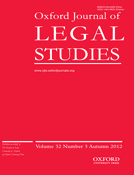
Oxford Journal of Legal Studies
Connecting Scholars and Practitioners in LawThe Oxford Journal of Legal Studies, published by Oxford University Press, stands as a prestigious platform for scholarly discourse within the field of law. Renowned for its impactful contributions to legal scholarship since its inception in 1981, this journal has established itself in the top tier of its category, currently classified as Q1 in Law based on the 2023 category quartiles. With its ISSN 0143-6503 and E-ISSN 1464-3820, the journal provides a comprehensive exploration of contemporary legal issues, theoretical perspectives, and empirical research, attracting contributions from leading academics and practitioners alike. Residing within the Social Sciences arena, it holds an impressive rank of 194/1025, landing it in the 81st percentile according to Scopus rankings. Though not currently an open-access publication, the Oxford Journal of Legal Studies remains vital for researchers, professionals, and students eager to deepen their understanding of legal frameworks and contemporary challenges within the legal landscape. Located in the heart of the United Kingdom, at Great Clarendon St, Oxford OX2 6DP, England, the journal is an indispensable resource for those advancing the study and practice of law.
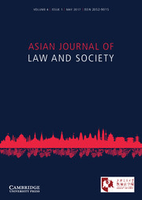
Asian Journal of Law and Society
Innovating Perspectives on Law and SocietyAsian Journal of Law and Society, published by Cambridge University Press, serves as a vital platform for scholarly discourse in the fields of law and social sciences. With an impressive 2023 impact factor placing it in the Q2 quartile in both law and sociology/political science categories, this journal is influential in shaping contemporary legal and sociological thought. Covering a broad range of topics, from legal frameworks in Asian contexts to the interplay between law and societal dynamics, the journal invites researchers, practitioners, and students to contribute original articles, critiques, and interdisciplinary analyses. Although it does not currently offer open access options, the Asian Journal of Law and Society continues to be recognized for its significant contributions, as reflected in its Scopus rankings, where it is positioned in the top 30% of law journals and around the 44% ranking in sociology and political science. This trajectory highlights its importance for anyone interested in understanding the complex legal landscapes and social structures across Asia.

Ius Canonicum
Empowering Researchers with Critical Perspectives on Law.Ius Canonicum is a distinguished academic journal published by UNIV NAVARRA, SERVICIO PUBLICACIONES, based in Spain. With an ISSN of 0021-325X and an E-ISSN of 2254-6219, the journal serves as a vital platform for scholars, researchers, and students delving into the realms of Law and Religious Studies. Recognized within the Scopus rankings, it holds a commendable position at Rank #120 in Religious Studies and Rank #540 in Law, reflecting its strong impact and relevance, particularly evident in its Q2 and Q3 category quartiles for 2023. Ius Canonicum seeks to foster international discourse on ecclesiastical law while providing critical insights into the evolving interpretations and applications of canonical principles. Despite its traditional publication model, the journal remains pivotal in advancing scholarly dialogue within its converged years from 2016 to 2024, serving as an invaluable resource for those engaged in legal studies and the theological dimensions of law.
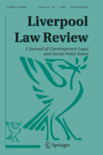
Liverpool Law Review
Empowering Legal Minds Through Accessible ScholarshipLiverpool Law Review, published by Springer, is a prestigious open-access journal in the field of law, dedicated to fostering scholarship and promoting dialogue on contemporary legal issues. Since its inception, the journal has evolved significantly, with a publishing history dating back to 1979 and showcasing an extensive range of articles and reviews that contribute to the development of legal theory and practice. The journal is indexed under Scopus, ranking #352 out of 1025 in the Social Sciences category, placing it in the 65th percentile—indicative of its solid reputation and relevance in the field. Liverpool Law Review provides an engaging platform for researchers, professionals, and students alike by facilitating access to high-quality legal research, with full open access available since 2012, ensuring that vital academic discussions are accessible to a global audience. With its commitment to exploring both historical and contemporary issues in law, this journal remains an essential resource for those seeking to deepen their understanding and contribute meaningfully to the legal landscape.

Revista de la Facultad de Derecho
Connecting Researchers and Practitioners in LawRevista de la Facultad de Derecho is an esteemed open-access journal published by the Universidad de la República, Facultad de Derecho, based in Montevideo, Uruguay. Since its inception in 2007, the journal has committed itself to disseminating high-quality legal scholarship, covering a wide range of topics within the field of law. With a dedication to promoting academic dialogue and advancing legal research, the journal serves as a vital resource for researchers, legal professionals, and students alike. The publication aims to foster discussions on contemporary legal issues while providing a platform for interdisciplinary insights. The journal is accessible online through its ISSN 0797-8316 and E-ISSN 2301-0665, ensuring that its content reaches a broad audience across the globe. With a focus on accessibility and scholarly rigor, the Revista de la Facultad de Derecho plays a pivotal role in advancing legal education and research in Latin America.
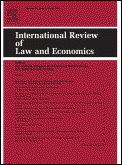
INTERNATIONAL REVIEW OF LAW AND ECONOMICS
Illuminating the Nexus of Law and Economic Analysis.The INTERNATIONAL REVIEW OF LAW AND ECONOMICS, published by Elsevier Science Inc, stands as a premier academic journal dedicated to the interdisciplinary exploration of law and economics since its inception in 1981. With an impressive convergence of insightful research and theoretical advancement, the journal encapsulates critical findings that bridge legal studies and economic principles. Ranked in the Q2 category for Economics and Econometrics and Finance, alongside a notable Q1 ranking in Law, it highlights its significant influence and high-quality scholarship within the academic community. The journal is indexed in Scopus, achieving commendable rankings which reflect its importance, ranking #188 out of 1025 in Law and #343 out of 716 in Economics and Econometrics. With no Open Access option specified, readers are encouraged to engage with the content through institutional access or subscription. This journal is essential reading for researchers, practitioners, and scholars looking to deepen their understanding of how legal frameworks intersect with economic theories, making it a vital resource in both fields.